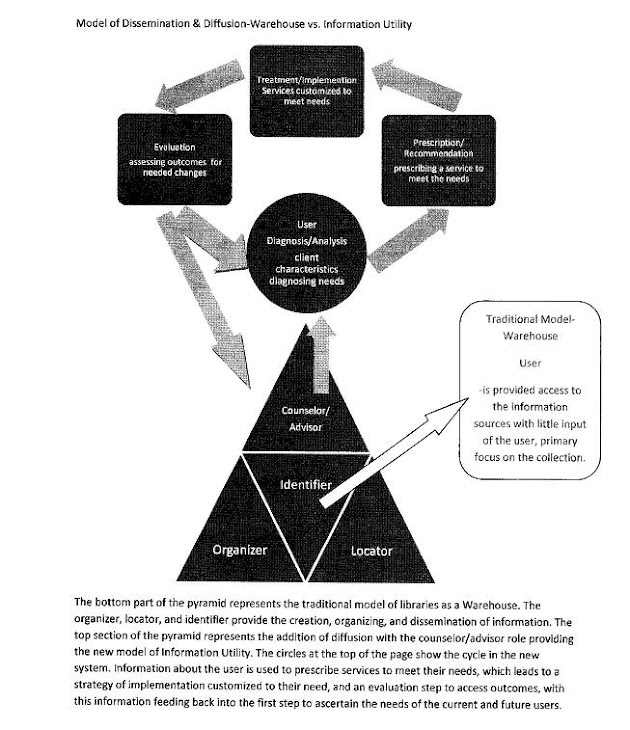Teaching and helping individuals learn information literacy skills are a very important part of dissemination and diffusion. Lesley Farmer (2002) in an article in Teacher Librarian talks about helping to make this more effective in schools with what she calls a research-based cycle of inquiry.
The process she recommends requires an across the school curriculum examination and development of a literacy skills program. The American Association of School Librarians has developed nine information literacy standards which include among others standard bibliographical instruction, locating and using information for both personal and academic uses, and ethical use. But to get past the traditional idea of information literacy as an add-on or separate entity the teacher-librarian needs to translate this into the specific language of each discipline. The more they understand the subject-area teachers’ perspective on this issue the more they can make it an integral element of education.
Farmer describes the cycle of inquiry as a seven step process.
- Define the desired outcome: information literate students
- Identify the outcome “gaps”: look at both the process and product. The librarian should talk to the teachers and the students to clarify questions about the entire process, to help identify the origins of information literacy problems leading to intervention.
- Describe the current practice relative to the outcome: librarians need to see the students’ final projects and the assignment itself. The assignment sheet helps identify the competencies expected of students, is it clear? Does it assume skills the students do not have? By examining final papers they can see what areas need work. They can also communicate across the curriculum to facilitate collaboration.
- Determine the possible reasons for the gaps: teachers can state the degree to which they incorporate information literacy in their project and then an information literacy “grid” can be developed to compare projects, competencies, and what is addressed at each grade level for each subject-area. This identifies what is being taught, reinforced, and what needs to be addressed.
- Identify and develop interventions targeted to address the gaps: the previous steps must be carried out in a systematic way and although this involves significant time it optimizes decision-making and implementation of the program.
- Implement the interventions
- Assess the results: how are the results manifested? By presenting clearer assignments, complete and accurate bibliographies in research papers, less plagiarism, and improved student work.
The research-based cycle of inquiry is a continuous cycle. Through this cycle Farmer (2002) states, “that the true power of information power reveals itself: lifelong learning that uses information in meaningful ways to transform individuals and society” (24).
I have always felt that if you teach someone how and where to find the answers to questions and how to evaluate what they find, then they can be well educated no matter what formal level of education they achieve. This is more important than any facts you can stuff into their heads. So to me information literacy should be the center of education not simply an add-on. What do you think?
Farmer, L. (2002, February). Harnessing the power in information power. Teacher
Information Science Full Text database.


1 comment:
I agree with the statement: "Teaching and helping individuals learn information literacy skills are a very important part of dissemination and diffusion." The information and data exists, but it must be brought to those who need it (disseminated) and then transformed into knowledge (diffusion). This is an important task for librarians. There are so many ways to aid the information seeker who is overwhelmed with so much data available. The difficult skill is to access the information and analyze and determine what is useful.
In my blog on information dissemination (see http://infodissemination.blogspot.com/) I posted an interestng article I read about a project to embed librarians in online courses. The idea is to respond to the changes in teaching (format -- online) and aid in information literacy. Some of the same ideas are discussed in that project that are included in the article you posted. An example is for the librarian to have a clear understanding of what is being taught, what is expected of the student, etc.
Students can benefit so much from these tailored programs that bring the service directly to the users.
Post a Comment